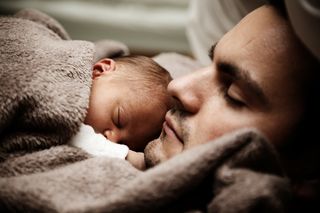Health
We Need To Talk About Dad's Mental Health
Why we need to include fathers when we talk about family wellbeing.
Posted June 17, 2018

In the last few years, we have taken a big leap in understanding and supporting maternal mental health and family well-being. But when it comes to supporting new fathers, we remain in the Dark Ages. Support for the changes and challenges new fathers face is largely absent from discussions of perinatal and postpartum health. For many men, this means the entry into fatherhood is confusing, painful, and stressful. In fact, some estimates reveal that more than 25 percent of new fathers experience depression in the first year – which is almost always undiagnosed and untreated. Reading about the life and tragic death of Anthony Bourdain this week, a longstanding depressed father, it is becoming increasingly clear what the outcome can be if we continue to ignore the mental health needs of fathers.
Our lack of support for new dads is a glaring gap in our efforts to improve mental health in families and children. Thankfully a small, emerging group of researchers and clinicians, like my colleagues who organize International Father's Mental Health Day, have begun to shed light on the critical changes and challenges that happen to a man and his family when he becomes a father.
Fatherhood is a Sea Change
Becoming a parent is a major developmental milestone for both men and women. It brings a level of biological, psychological, and relationship changes not seen since puberty. And although health professionals educate many new parents about what these changes look like for a new mom, few people hear about a new father's transition. This is especially true about the biological and hormonal changes that have can have a large impact on a new dad's mood and behavior.
Starting a few months before childbirth, testosterone levels lower as prolactin, vasopressin, and other hormones increase, rewiring a man's brain to prepare him for fatherhood. Entire areas of a man's brain grow and develop in response to hormonal changes in the first year of a child's life, which equip him with crucial skills to care for a newborn. This includes an increased sensitivity to crying, a deeper capacity to bond emotionally, and a greater responsiveness to another's needs. Similar to the adaptive hormonal changes women experience, these shifts also increase a man's chances of experiencing clinical depression or mood disorders.
The Psychological Impact of Parenting
Psychologically, men face some of the toughest developmental challenges they have ever faced as they enter fatherhood. According to Bruce Linton, PhD, founder of Father's Forum, a national organization of support groups for new fathers, the transition to fatherhood involves a series of very difficult psychological tasks. A man is required to resolve his own conflicts concerning his father, negotiate emotional uncertainty, learn to be dependent on others and let others be dependent on him, and find a community with other fathers. None of these tasks is possible without some level of support and understanding.
New fathers also face challenges and changes in the relationship with their partner that few fully anticipate. Suddenly the need to argue, negotiate, and resolve conflicts about parenting takes center stage in their relationship. At the same time, sex and relational satisfaction are not a priority. Many men who have relied on their partners for emotional support and intimacy are now left feeling guilty, resentful, and confused as they try to figure out how to support their partners while sacrificing their own support and need for intimacy.
Facing the fiscal reality of a larger family as well as their spouse's possible (if temporary) departure from the workforce, new fathers also often face a level of stress relating to their work performance and income they haven't experienced since their first job. It's no wonder that one of the biggest relationship changes men (and women) face at this time is the sheer volume of conflict in their relationship.
Involved and Supported Dads are Good Fathers
With help and attention from their spouses, fatherhood groups, and preventive mental health treatment (when necessary), new fathers who are struggling can find enhanced meaning, pride, and contentment in tending to their families while learning ways to cope with their own anxieties and doubts.

With this kind of support, fathers are immediately able to reap the emotional benefits when "the love hormone" oxytocin begins to flow through their bodies as they care for, play and interact with their children. A new sense of meaning and satisfaction also quickly arises as fathers begin to teach their children all about the world around them. The first few years are filled with powerful moments in emotional attunement where many men revisit their relationship with vulnerability and emotions as they notice how healing it can be for their children when they hold them, reassure them, and comfort them.
In places such as Sweden, Norway, and Finland where men are given extended paternity leave that is protected by law, researchers have seen big gains in men's confidence and desire to be caregivers, rather than just breadwinners and support personnel.
Involved and Supported Dads are Good for Families
Supported and involved dads benefit the whole family. National polls and census data indicate that having a genuine connection with an actively involved father may help protect children from negative life outcomes such as not completing high school or developing behavioral problems. And engaged fathers appear to benefit children in a number of cognitive skills including academic performance, problem solving skills, and intellectual ability.
Beyond cognitive skills, emotionally responsive dads can have a lasting impact on their children's emotional development. From better emotional regulation to social skills and even emotional intelligence, more and more research suggests that when fathers are able to model and handle emotions well, their children benefit immensely.
An emotionally healthy father also appears to greatly improve their partner's mental health. From pregnancy through postpartum and beyond, research indicates that fathers who are emotionally responsive and supportive have partners who report significantly less stress, anxiety, and depressive symptoms – especially postpartum/postnatal depression.
Don't believe me? Watch how comedian Michael Jr breaks it down.
Addressing the Silent Epidemic of Paternal Mental Illness
With support and understanding, many men can thrive during the challenges of new fatherhood. But unfortunately, most men don't receive it. An abundance of data from the new field of paternal mental health points to one message: Fathers are struggling and suffering with mental health difficulties at about the same rate as mothers.
As many as one in four new fathers in the United States may experience major depression four weeks after the birth of a child. Up to 50 percent of men report paternal depression when their partner is struggling with postpartum depression, and an estimated 18 percent of men experience anxiety in the postpartum period that warrants formal diagnosis and treatment. Although these numbers may be startling, what's even more shocking is that the majority of these mental health difficulties go unnoticed, undiagnosed, and untreated. In fact, many of the men brave enough to come forward to speak about their postnatal depression or anxiety are often met with scorn, ridicule, and shame in comments sections. A glance at the comments and tweets in the NY Times and Washington Post reveals that many people would prefer to keep silencing men's postnatal mental health experiences and continue to stigmatize men away from seeking formal mental health treatment.
For the sake of our families and our fathers, it's time to stop pretending that men's experiences and roles don't matter as much as women's do in the first years of a child's life. Let's refocus the clinical lens and pay attention to the whole family.
Looking for resources you can use now?
Postpartum Support International has monthly call ins with psychologist and paternal mental health expert Dr. Daniel Singley.
City Dads Group has chapters all over the United States dedicated to building a community of support and advice among dads featuring almost daily meetups and podcasts.
International Father's Mental Health Day is June 18th, 2018 and will feature a FB live Q+A with founding organizer, Dr. Andrew Mayers.
The Motherhood Center of New York offers weekly fatherhood seminars and Q+A run by New York City psychologist and author of this blog, Dr. Chuck Schaeffer.




